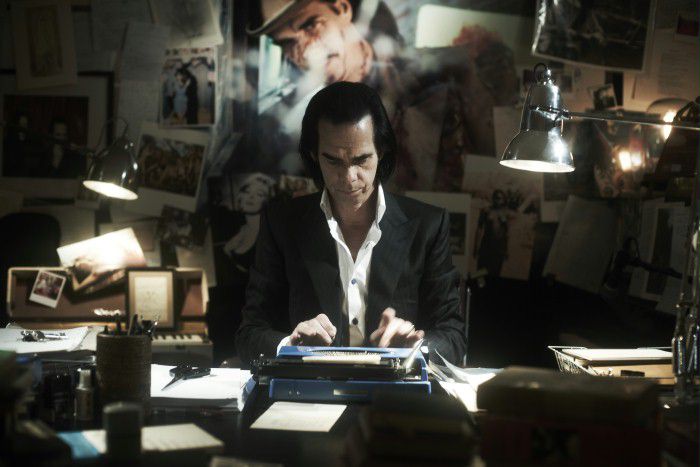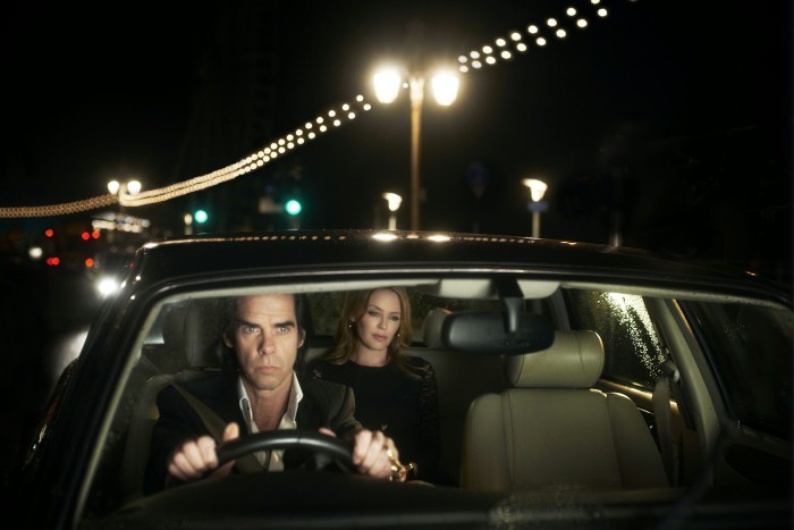
20,000 days on earth: Nick Cave, the cannibal
Published on
Translation by:
 Danny S.
Danny S.
"Once you have understood a song, it's not of much interest anymore." What is a day in the life like for Nick Cave, the demigod of poetic Alternative Rock? In 20,00 Days on Earth (2013) we watch Cave sing and reflect, get to laugh about Nina Simone and marvel at the Australian musician's enigmatic nuttiness. Film review
"I could control the weather with my mood back then. I just couldn't control my moods, you know." While the half morose, half pensive Nick Cave swaggers under the rainy skies of the southern English town of Brighton, seagulls mew overhead. Walking down the boardwalk with his black suit, shoulderlength hair and thick gold rings, he comes across as an alien who's just come on a visit to Earth. But if anything, he looks more like a cannibal: "Of the kind with big lips, high cheekbones and a bone through the nose." He's lasted 19,999 days on Earth, but now that the 20,000th day has passed, he's no longer human.
What does Nick Cave do when he's not on stage?
How exactly musician and private citizen Nick Cave spends this fictitious 20,000th day is told by Jane Pollard and Iain Forsyth in their documentary 20,000 Days on Earth (2013). The film's script, which interweaves the life of the musician with his songs, poems and memories, was written in part by Cave himself. It's arguable how much of a documentary it actually is, but it's the poetic quality of the texts that elevates this portrait to a masterpiece. One example is when Cave meets up with his bearded bandmate Warren Ellis from the Bad Seeds and reflects on a concert with Nina Simone: "That night, Nina was in a really bad mood. All she really wanted was champagne, cocaine and sausages." Before starting to perform, she stuck her piece of gum to the concert grand, which Ellis later peeled off to save for posterity.
Stories like these make 20,000 Days on Earth more than just a narrative of the artistic life of Cave, who was born in 1957 in the Australian town of Warracknabeal. For Pollard and Forsyth it's more about giving Cave a cinematic platform through which he and his music can be reflected in all their poetical highs and lows. Cave's monologues and studio recordings are interrupted by dialogues with musical companions, among which are Blixa Bargeld and Kylie Minogue, while archivists rummage through material from the Nick Cave Collection from the Arts Centre Melbourne. Surprisingly, Nick Cave, who occasionally reflects about the "godlike qualities" of the rock musician, doesn't come across as pretentious at all.
Important Shit and brilliantly eccentric songwriting
Out of his "important shit" 20,000 Days on Earth weaves a tapestry of a deep thinker who delights in metaphors and poetic speech, hacks away at stories on his typewriter every morning and who even finds the time to write songs. According to Nick Cave, life and music are always about the retelling of a story, about the mythologizing of memories and their elaboration through music: "Once you have understood a song, it's not of much interest anymore." Just as gripping are the scenes where Cave sits with his bandmates from the Bad Seeds, improvises with Warren Ellis or conducts a French children's choir. Once one pictures these images while listening to the songs from the album Push the Sky Away (2013), the music begins to seem more thought-out and organized.
 The emphasis clearly lies on the current Nick Cave, while his biographical and musical past only flicker past us. In one take, for example, he reflects his childhood in a staged conversation with the psychoanalyst Darian Leader, who is wonderfully stereotyped with his metal-rimmed glasses. His London days too curdle into anecdotes, which revolve around meeting his wife Susie: "Back then, I was a junkie, but went to church every Sunday morning. I'd listen to what the priest had to say, then I went to Portobello Road to score. That seemed right: something good balanced by something bad." But then Susie saved him from himself: "She told me that I was doing something dangerous and potentially life hazardous. I then had to promise to never go to church again."
The emphasis clearly lies on the current Nick Cave, while his biographical and musical past only flicker past us. In one take, for example, he reflects his childhood in a staged conversation with the psychoanalyst Darian Leader, who is wonderfully stereotyped with his metal-rimmed glasses. His London days too curdle into anecdotes, which revolve around meeting his wife Susie: "Back then, I was a junkie, but went to church every Sunday morning. I'd listen to what the priest had to say, then I went to Portobello Road to score. That seemed right: something good balanced by something bad." But then Susie saved him from himself: "She told me that I was doing something dangerous and potentially life hazardous. I then had to promise to never go to church again."
Although Nick Cave appears in 20,000 Days on Earth as musician, author and actor in all his artistic prowess, the film is reflected well enough to not drift into the hagiographic: "You have to recognize your limitations. Because these limitations make you the wonderful catastrophe that you probably are." But Nick Cave's fictious 20,000th day on Earth must have been a good one, because his catastrophic side is hardly seen on his strolls through Brighton. Those who don't like him or his music or those who expect difinitive answers might not like this film. Why won't Nick Cave eat roasted eel with whole grain pasta? And why does Miley Cyrus drift like a ghost through one of his new songs? In 20,000 Days on Earth, questions like these remain unanswered.
But this wouldn't fit Nick Cave's concept of reality anyway, given that he has little interest for the things he understands: "It's about what lies beneath the surface of reality, like the humps of a sea monster. The goal in music and performing is to tempt that monster to the surface." Cave surely pulls this off when he sweeps across the stage performing his song Jubilee Street in one of the last scenes, dressed in a glittery shirt. Whether monster, alien or cannibal, Nick Cave seems to be suited to anything that's out of the ordinary. He could probably even sport a bone pierced through his nose.
CAFEBABEL BERLIN BEI DER 64. BERLINALE
 We love films! You can get our daily updates directly through our magazine or through Berlin.Babel.Blog und @CafebabelBerlin. Look forward to gripping film reviews, interviews with undiscovered stars and lots of photos from around the Berlinale Palace.
We love films! You can get our daily updates directly through our magazine or through Berlin.Babel.Blog und @CafebabelBerlin. Look forward to gripping film reviews, interviews with undiscovered stars and lots of photos from around the Berlinale Palace.
Translated from 20,000 Days on Earth: Nick Cave, der Kannibale


